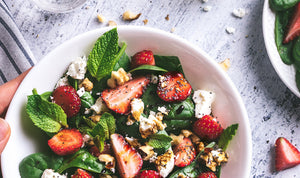5 Tips for Better Digestion
In my clinical practice I would say that 99% of my clients have an issue with digestion. Whether that’s bloating, a sore tummy, pains, constipation, loose bowel movements (or oscillating between both), intolerances to certain foods like dairy or high FODMAP foods such as onion, garlic and beans or simply feeling like they haven't digested their food properly. Sound familiar?
I’m not going to focus on the why today, because that’s individual and specific to each of us, but instead give you some practical tips and first interventions that you can use to support and improve your digestive function whatever the cause.
And it all begins with the digestive dominoes.
Have you ever heard the phrase “digestion begins in the mouth”? It’s alluding to the fact that to have good digestion we need to chew our food thoroughly. I’ll come to that in a minute, because it is really crucial, but actually digestion begins even before we start to chew our food, with the cephalic phase of eating.
The cephalic phase refers to everything we do before we actually put anything in our mouths, and involves smell, sight and touch. When we smell something delicious we start to salivate, thus producing salivary enzymes like amylase and lipase. These start the digestion of our food so that by the time it hits the stomach it’s already been partially broken down. The same can be said for sight and texture, seeing something super delicious come out of a restaurant kitchen gets you primed and ready to eat, and when you’re cooking for yourself at home, touching the food, smelling the aromas as the onions and garlic gently fry in the pan… it’s a really important digestive phase because we’re essentially priming the rest of the digestive processes to look sharp, get ready and start working!
Now you can see why I like to compare digestion to a game of dominoes - without that first initial phase being completed correctly, (and the next one, and the next one), the dominoes further down the line won’t topple over smoothly. So you can see how something as simple as chewing your food thoroughly means that the stomach and small intestine (and large intestine and colon) are going to function more optimally too.
So, once you’ve got your head around eating mindfully and taking time to prepare and think about your meal, chewing is the next big step and it’s my first top tip for anyone wanting to reduce bloating and improve digestion.
- Chew your food
When you swallow your food it should be completely unrecognisable. So if you had a mouthful of food (bear with me here), and you opened your mouth to show me it before you swallowed it (sorry!), I shouldn’t be able to tell you what you ate - no bits of carrot, no obvious peas or pieces of sweetcorn, completely unrecognisable. Unsurprisingly it takes quite a lot of effort to get to this stage, and the majority of us barely chew our food at all. This then means that stomach acid has to work harder to fully break down our food before it hits the small intestine. The small intestine is an environment that’s ripe for fermentation, and if we have any large molecules of food floating around in there we’re far more likely to notice the effects: boating, gas, discomfort.
P.s. you also need to chew your smoothies!
- Optimise stomach acid
Again, coming at you with anecdotal (but relevant) data here but most of my client population seem to have low stomach acid. I'd love to see some actual data on what percentage of the UK population does, because I’d bet a small fortune that it would be sky high. Just like the cephalic phase and chewing, having adequate levels of stomach acid to break down food and also keep the pH of the stomach in the correct range is crucial. It’s really protective against SIBO (Small Intestine Bacterial Overgrowth), which can cause incredibly uncomfortable symptoms like excessive bloating, smelly farts and strange bowel movements!
We need nutrients to make stomach acid, specifically the B vitamins, zinc and iron, but it’s also incredibly adversely affected by stress. Taking steps to manage your stress levels, especially around the time of eating, will really help.
- Avoid lots of liquid at mealtimes
If you’re someone that feels you really need to drink a lot of water whilst you’re having your meal, there’s something amiss. It’s probably a sign that your digestion isn’t optimised if you’re feeling like you need extra help with lubrication, but it won’t be doing you any favours at all. Drinking lots of water with a meal (or squash, juice, tea etc) dilutes your digestive juices and that all important stomach acid. Wait at least 30-60 minutes after a big meal before chugging a large glass of water! And if you feel dehydrated, perhaps you need to read this post! (link to hydration post)
- Include some naturally fermented foods each day
Studies show that good levels of ‘healthy’ gut bugs like bifidobacteria and lactobacillus help us break down our food properly in the GI tract, plus they also help to boost levels of the helpful strains of bacteria. Try adding raw, live saurkraut or kimchi to your scrambled eggs in the morning, or make your smoothie with kefir. Good quality kombucha is a nice option too, as well as fermented vegetables and pickles, plus tempeh (over tofu every time!)
- Prioritise diversity
Not only do we need fibre to keep us regular, both soluble and insoluble, but we know now from research around gut health that diversity of plant fibres is crucial for maintaining a healthy gut microbiome. If you’re a numbers person, then you’re looking at minimum 30 different plant based foods per week, if you’re not, you could prioritise eating with the seasons so that you’re always getting seasonal varieties. It’s extremely common to just go to the supermarket and buy the same veggies week on week, but you will really notice the benefits to your health if you can branch out and diversify. Aim for at least one thing from every colour of the rainbow per day (a great one to play with kids), and then try and vary that colour each day if you can: eg you had aubergine for purple on Monday, can you have blackberries (nearly in season!) or red cabbage on Tuesday?
If you think you need guidance above and beyond these basics then get in touch with a Nutritional Therapist / Functional Medicine practitioner to help you get to the root cause of your symptoms!
gracekingswell.com
@gracekingswell

